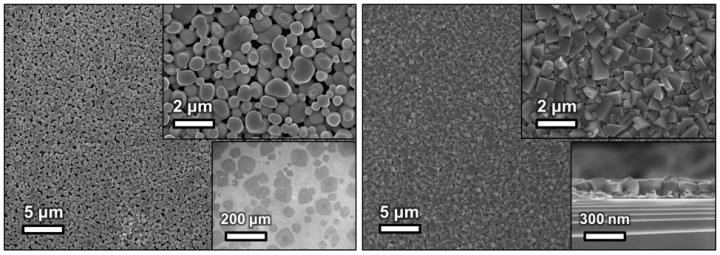Processes for perovskite creation either take the approach of chemical vapor coating or solution crystallization. The team from the Moscow university has discovered that several new compounds, known as polyiodides, which are liquid at room temperature, react upon contact with a lead compound film, to form a film of interpenetrating perovskite crystals.
In the process, a lead layer is applied to a glass substrate via thermal spraying. The glass then rotates as polyiodide is spilled on to it, before polyiodide residue is flushed using a solvent. Lomonosovo University states that the process results in perovskite films between 200 and 700 nm thick.
“The perovskite film exhibits intense photoluminescence and large lifetime of charge carriers that provides good functional properties, comments lead researcher Alexey Tarasov. “We have also revealed in our project the possibility to obtain perovskite films of various compositions, while using mixed polyiodide compositions.”
Instability is an issue that has plagued perovskite’s development as a solar cell material. However, scientists from the university’s faculty of material sciences also showed that the process allows for the possibility of different composition of polyiodides, and therefore the potential to develop a composition with optimal stability.
The research was conducted in cooperation with scientists from the Swiss Federal Institute of Technology in Lausanne, and funded by the Russian Ministry of Education and industrial partner EuroSibEnergo Company. Lomonosov Moscow State University stated that it will continue to study the properties of polyiodides with the ultimate aim of creating high efficiency solar cells.
This content is protected by copyright and may not be reused. If you want to cooperate with us and would like to reuse some of our content, please contact: editors@pv-magazine.com.




By submitting this form you agree to pv magazine using your data for the purposes of publishing your comment.
Your personal data will only be disclosed or otherwise transmitted to third parties for the purposes of spam filtering or if this is necessary for technical maintenance of the website. Any other transfer to third parties will not take place unless this is justified on the basis of applicable data protection regulations or if pv magazine is legally obliged to do so.
You may revoke this consent at any time with effect for the future, in which case your personal data will be deleted immediately. Otherwise, your data will be deleted if pv magazine has processed your request or the purpose of data storage is fulfilled.
Further information on data privacy can be found in our Data Protection Policy.